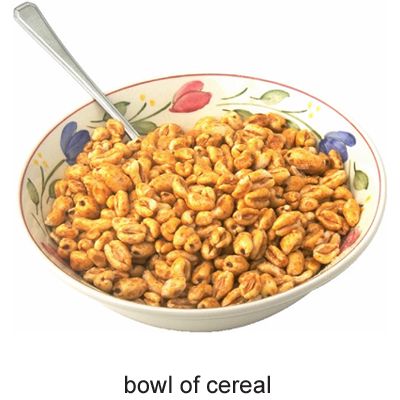From Longman Dictionary of Contemporary Englishcerealce‧re‧al /ˈsɪəriəl $ ˈsɪr-/ ●●● S3 noun 1  [countable, uncountable]DF a breakfast food made from grain and usually eaten with milk a bowl of breakfast cereal2 [countable]TAC a plant grown to produce grain, for example wheat, rice etc cereal crops
[countable, uncountable]DF a breakfast food made from grain and usually eaten with milk a bowl of breakfast cereal2 [countable]TAC a plant grown to produce grain, for example wheat, rice etc cereal crops
 [countable, uncountable]DF a breakfast food made from grain and usually eaten with milk a bowl of breakfast cereal2 [countable]TAC a plant grown to produce grain, for example wheat, rice etc cereal crops
[countable, uncountable]DF a breakfast food made from grain and usually eaten with milk a bowl of breakfast cereal2 [countable]TAC a plant grown to produce grain, for example wheat, rice etc cereal cropsExamples from the Corpus
cereal• Eaten with milk or cream, they made an acceptable breakfast cereal.• Some products that bear freshness dates are cheeses, breakfast cereals, bakery products, and mayonnaise.• Looking at the table we can see how low the calcium level is in cereals.• Lucky Charms Nestlé's kicking cereal.• a bowl of cereal• It seems as though every day a new kind of cereal appears on the grocery shelves.• Millet was still the primary cereal crop.• Half of Britain's cereal farms rank among the big 300,000.• Soon afterwards, he moved from livestock to cereal.breakfast cereal• Most over-the-counter breakfast cereals have 2 to 4 grams of fiber, and high-fiber cereals have up to 9 grams.• Advertisements for breakfast cereals may present a happy, harmonious family in a sunny bright kitchen.• The local grocery in Brandon, Manitoba, sports 12,000 food products and flaunts 56 brands of breakfast cereal.• It was when I went on breakfast cereals that liquor got me.• In the supermarkets of Colombo and Kandy, Puffa-Puffa-rice breakfast cereal is on sale for the equivalent of three dollars a packet.• Bread, rolls, breakfast cereal, bananas and fried fruit are ideal.• Alternate among several breakfast cereals that contain four grams of fiber or more per serving.• Euell Gibbons once claimed on my living room television that some breakfast cereal tasted like hickory nuts.Origin cereal (1800-1900) French céréale, from Latin cerealis “of Ceres”, from Ceres ancient Roman goddess of grain and farming 
